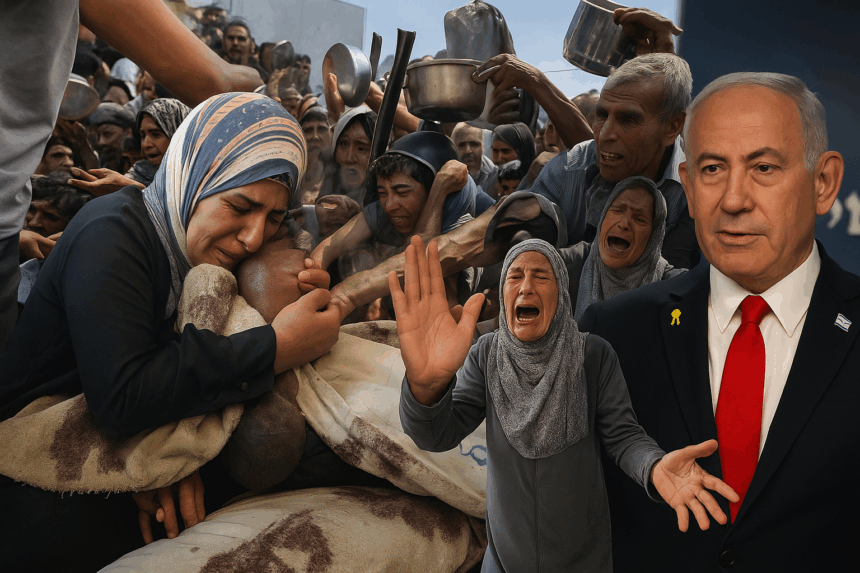When Benjamin Netanyahu told Patrick Bet-David, “I just did. Here you go,” effectively recognizing the Armenian ‘genocide’ on a podcast, it sounded like a moral awakening wrapped in a sound bite. But timing is meaning. The declaration arrived as Gaza’s civilian death toll climbed past 62,000, famine was “irrefutably” confirmed by UN agencies, and the International Criminal Court had already issued arrest warrants for Netanyahu and Yoav Gallant for alleged war crimes and crimes against humanity—including starvation as a method of warfare. Recognition of one historical atrocity does not launder the present.
Asked on Tuesday by Patrick Bet-David on his podcast why Israel does not recognize the Armenian “genocide,” Netanyahu said, “I think we have. I think the Knesset passed a resolution to that effect,” though no such legislation has been passed into law.
Bet-David is an American businessman, media personality and podcaster who was born into a Christian family of Assyrian and Armenian descent in Iran.
Pressed on why no Israeli prime minister has recognized the genocide, Netanyahu responded, “I just did. Here you go.”
Armenia and some historians claim that many Armenians were killed by Ottoman forces or died during deportations of over 1.5 million people between 1915 and 1917 during World War I. Over 30 countries have recognized the killings as genocide, a claim vigorously denied by Turkey. Israel has not joined this recognition.
Ankara promptly called the podcast remark a political ploy—“an attempt to exploit past tragedies for political reasons.” You don’t have to endorse Turkey’s broader posture to see the obvious: the spectacle of an embattled wartime prime minister invoking 1915 on a talk show, while his own campaign in Gaza is under the heaviest legal and moral scrutiny of his career, is exactly the kind of reputational maneuver governments deploy when the facts on the ground are brutal and unrelenting.
On the facts, that perception is not conjured from thin air. UN agencies and the IPC Famine Review Committee now say famine conditions exist in Gaza, with more than half a million people trapped in starvation—an outcome that followed Israel’s declared “total blockade” early in the war and months of severe aid restrictions. Whether you call it “weaponizing aid” or “starvation as a method of warfare,” the legal frame is the same: intentionally depriving civilians of objects indispensable to survival is a grave breach of international law. That is why “starvation” appears explicitly in the ICC’s charging language.
The killing is staggering and heavily civilian. Recent analyses—drawing in part on Israel’s own internal data—indicate a civilian share of deaths that is extraordinary by modern-war standards. Even if you discount any one outlet’s framing, the pattern remains: densely populated areas repeatedly struck; hospitals and shelters hit; journalists killed at historic rates; and a population pushed, neighborhood by neighborhood, into narrower zones amid rolling evacuation orders. None of this becomes less real because a prime minister reaches for moral authority on a podcast.
Legally, the genocide question is before the International Court of Justice, which has ordered provisional measures—including ensuring access to food and basic services—while it examines South Africa’s claim under the Genocide Convention. Politically, however, for billions watching daily images of bombardment, displacement, and children wasting from hunger, the judgment has already been rendered in the court of public opinion. That is what makes Netanyahu’s sudden embrace of 1915 so jarring: it reads less like truth-telling and more like truth-shielding.
Two things can be true at once. First, recognizing the Armenian genocide is morally right and long overdue for many states—including Israel. Second, using that recognition as a rhetorical smokescreen while presiding over a campaign accused of mass atrocities is precisely the “pot calling the kettle black.” If consistency matters, then the standard invoked for Armenians in 1915 must also apply to Palestinians in 2023–2025: protect civilians, allow unfettered humanitarian access, end starvation tactics, release hostages, and submit conduct to independent investigation and accountability. Anything less empties “never again” of meaning.
Israel’s leaders often argue that Hamas embeds within civilian areas and bears ultimate responsibility for Palestinian suffering. International law does not accept that as a license to starve or to bomb indiscriminately. The ICC’s warrants and the ICJ’s orders are not final verdicts, but they are bright, flashing warnings that the world’s highest legal bodies see credible bases for grave charges and urgent restraints. If the government believes its campaign is lawful, it should welcome intrusive monitoring, open crossings at scale, and let facts—not talking points—carry the day.
There is also a lesson here for everyone else: moral credibility is not a currency you can print on demand. It is earned by aligning words with deeds—consistently, not selectively. Recognize 1915, yes. But recognition is not absolution. Until the bombs stop, the trucks roll, the hostages come home, and independent investigators can work without obstruction, no amount of historical truth-telling will distract from the live genocide taking place in Gaza for almost two years.







